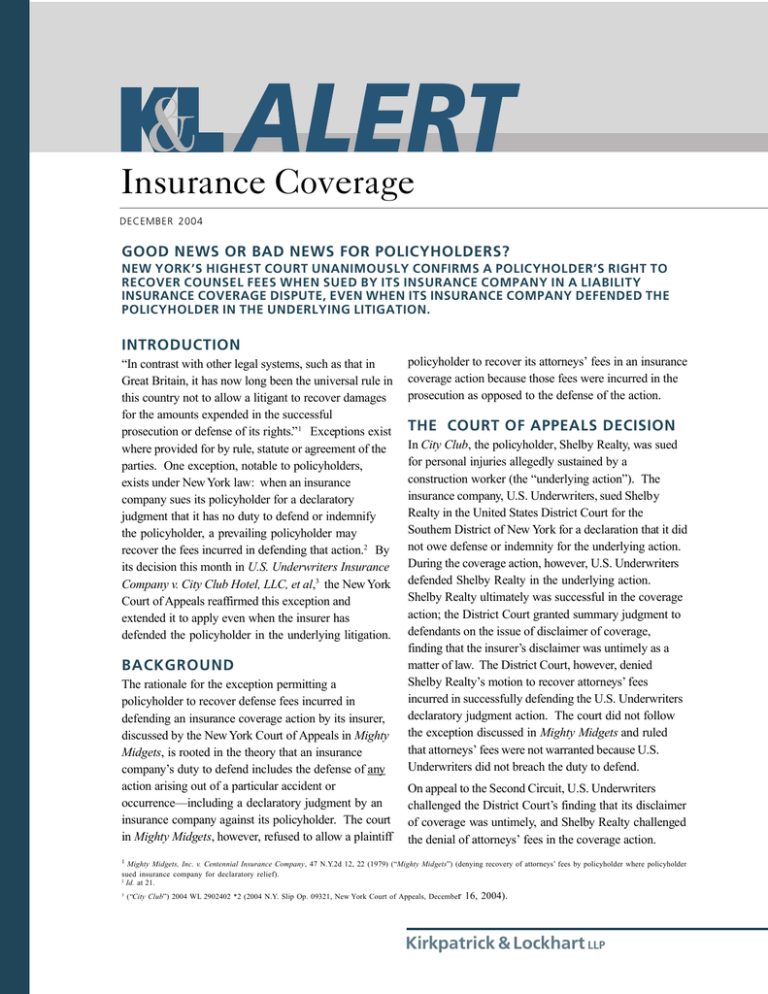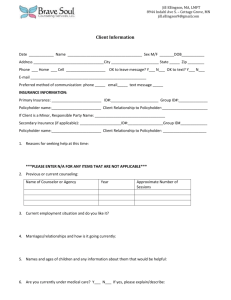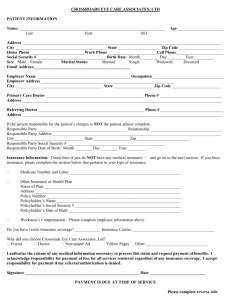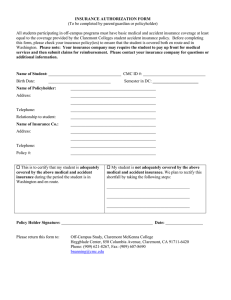Insurance Coverage GOOD NEWS OR BAD NEWS FOR POLICYHOLDERS?
advertisement

Insurance Coverage DECEMBER 2004 GOOD NEWS OR BAD NEWS FOR POLICYHOLDERS? NEW YORK’S HIGHEST COURT UNANIMOUSLY CONFIRMS A POLICYHOLDER’S RIGHT TO RECOVER COUNSEL FEES WHEN SUED BY ITS INSURANCE COMPANY IN A LIABILITY INSURANCE COVERAGE DISPUTE, EVEN WHEN ITS INSURANCE COMPANY DEFENDED THE POLICYHOLDER IN THE UNDERLYING LITIGATION. INTRODUCTION “In contrast with other legal systems, such as that in Great Britain, it has now long been the universal rule in this country not to allow a litigant to recover damages for the amounts expended in the successful prosecution or defense of its rights.”1 Exceptions exist where provided for by rule, statute or agreement of the parties. One exception, notable to policyholders, exists under New York law: when an insurance company sues its policyholder for a declaratory judgment that it has no duty to defend or indemnify the policyholder, a prevailing policyholder may recover the fees incurred in defending that action.2 By its decision this month in U.S. Underwriters Insurance Company v. City Club Hotel, LLC, et al,3 the New York Court of Appeals reaffirmed this exception and extended it to apply even when the insurer has defended the policyholder in the underlying litigation. BACKGROUND The rationale for the exception permitting a policyholder to recover defense fees incurred in defending an insurance coverage action by its insurer, discussed by the New York Court of Appeals in Mighty Midgets, is rooted in the theory that an insurance company’s duty to defend includes the defense of any action arising out of a particular accident or occurrence—including a declaratory judgment by an insurance company against its policyholder. The court in Mighty Midgets, however, refused to allow a plaintiff policyholder to recover its attorneys’ fees in an insurance coverage action because those fees were incurred in the prosecution as opposed to the defense of the action. THE COURT OF APPEALS DECISION In City Club, the policyholder, Shelby Realty, was sued for personal injuries allegedly sustained by a construction worker (the “underlying action”). The insurance company, U.S. Underwriters, sued Shelby Realty in the United States District Court for the Southern District of New York for a declaration that it did not owe defense or indemnity for the underlying action. During the coverage action, however, U.S. Underwriters defended Shelby Realty in the underlying action. Shelby Realty ultimately was successful in the coverage action; the District Court granted summary judgment to defendants on the issue of disclaimer of coverage, finding that the insurer’s disclaimer was untimely as a matter of law. The District Court, however, denied Shelby Realty’s motion to recover attorneys’ fees incurred in successfully defending the U.S. Underwriters declaratory judgment action. The court did not follow the exception discussed in Mighty Midgets and ruled that attorneys’ fees were not warranted because U.S. Underwriters did not breach the duty to defend. On appeal to the Second Circuit, U.S. Underwriters challenged the District Court’s finding that its disclaimer of coverage was untimely, and Shelby Realty challenged the denial of attorneys’ fees in the coverage action. 1 Mighty Midgets, Inc. v. Centennial Insurance Company, 47 N.Y.2d 12, 22 (1979) (“Mighty Midgets”) (denying recovery of attorneys’ fees by policyholder where policyholder sued insurance company for declaratory relief). 2 Id. at 21. 3 (“City Club”) 2004 WL 2902402 *2 (2004 N.Y. Slip Op. 09321, New York Court of Appeals, December 16, 2004). Kirkpatrick & Lockhart LLP Noting a division in interpreting the relevant law, the Second Circuit certified the following question to the New York Court of Appeals: whether a policyholder may recover attorneys’ fees expended in successfully defending a declaratory judgment action brought by its insurance company to determine that it has no obligations under its insurance policy, even though its insurance company defended the policyholder in the underlying suit. On review, the New York Court of Appeals rejected the District Court’s ruling in denying Shelby Realty’s motion for attorneys’ fees. Citing the rationale set forth in Mighty Midgets, the Court of Appeals unanimously reaffirmed that a prevailing policyholder is entitled to recover attorneys’ fees incurred in defending an insurer’s declaratory judgment action by holding that Shelby Realty was entitled to recover its attorneys’ fees. The Court of Appeals explained: IMPLICATIONS OF THE CITY CLUB DECISION First, the New York Court of Appeals’ decision in City Club unanimously confirms that a policyholder who successfully defends itself in a coverage suit initiated by its insurance company will be reimbursed for the costs incurred in defending that suit. Second, such a policyholder will be reimbursed regardless of whether the insurance company provided a defense in the underlying action. An insurance company, however, now has less incentive to defend its policyholder— under a reservation of rights or otherwise—if it intends to sue its policyholder for declaratory judgment in New York or under New York law. These implications should carefully be considered by a policyholder that potentially is subject to New York law in a dispute with its insurance company—before it or its insurance company files suit. Given that the expenses incurred by Shelby [Realty] in defending against the declaratory judgment action arose as a direct consequence of U.S. Underwriters’ unsuccessful attempt to free itself of its policy obligations, Shelby is entitled to recover those expenses from [U.S. Underwriters]. In other words, Shelby [Realty]’s recovery of attorneys’ fees is incidental to the insurer’s contractual duty to defend To be sure, City Club is a policyholder-friendly decision. At the same time, the decision may negatively impact policyholders. DAVID S. KWON dkwon@kl.com 973.848.4025 ROBERT F. PAWLOWSKI rpalowski@kl.com 973 .848.4032 The Insurance Coverage practice group at Kirkpatrick & Lockhart LLP is one of the nation’s largest policyholder-oriented practices. Its attorneys have authored Policyholder’s Guide to the Law of Insurance Coverage and edited the Journal of Insurance Coverage. FOR ADDITIONAL INFORMATION about these issues, please consult the authors or any of Kirkpatrick & Lockhart’s office contacts listed below: National Boston Dallas Harrisburg Los Angeles Miami Newark New York Pittsburgh San Francisco Washington, D.C. Peter J. Kalis John M. Edwards Robert Everett Wolin Carleton O. Strouss David P. Schack DanielA. Casey Anthony P. La Rocco Peter J. Kalis Thomas M. Reiter Edward P. Sangster Matthew L. Jacobs 412.355.6562 617.261.3123 214.939.4909 717.231.4503 310.552.5061 305.539.3324 973.848.4014 212.536.4828 412.355.8274 415.249.1028 202.778.9393 pkalis@kl.com jedwards@kl.com rwolin@kl.com cstrouss@kl.com dschack@kl.com dcasey@kl.com alarocco@kl.com pkalis@kl.com treiter@kl.com esangster@kl.com mjacobs@kl.com ® Kirkpatrick & Lockhart LLP Challenge us. ® www.kl.com BOSTON ■ DALLAS ■ HARRISBURG ■ LOS ANGELES ■ MIAMI ■ NEWARK ■ NEW YORK ■ PITTSBURGH ■ SAN FRANCISCO ■ WASHINGTON ......................................................................................................................................................... This publication/newsletter is for informational purposes and does not contain or convey legal advice. The information herein KIRKPATRICK & LOCKHART LLP INSURANCE COVERAGE ALERT should not without first consulting a lawyer. The attorneys 2 be used or relied upon in regard to any particular facts or circumstances resident in all offices, unless otherwise indicated, are not certified by the Texas Board of Legal Specialization. © 2004 KIRKPATRICK & LOCKHART LLP. ALL RIGHTS RESERVED.
![[Date] [Policyholder Name] [Policyholder address] Re: [XYZ](http://s3.studylib.net/store/data/008312458_1-644e3a63f85b8da415bf082babcf4126-300x300.png)





